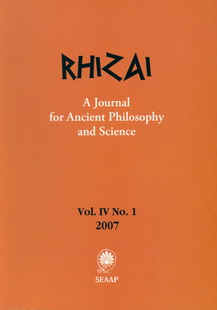On the Unity and the Aim of the Derveni Text
On the Unity and the Aim of the Derveni Text
Author(s): Michael FredeSubject(s): Philosophy
Published by: Издателство »Изток-Запад«
Keywords: fire; justice; piety; impiety; gods; creation; cosmos; order; cosmology; cosmogony; Orphic; Orpheus; Plato; Heraclitus; Zeus; Ouranos; Kronos
Summary/Abstract: The paper sets out to give in broad outline a comprehensive interpretation of some features of the Derveni text. In some important issues, this text should be seen in the context of the fourth century, rather than the late fifth century. Unfortunately, this 4th c. BCE literature has disappeared almost without a trace, the best characterization of this literature we have is in Plato’s polemical descriptions, most particularly, the one he puts forth as a refutation of different forms of atheism in Laws X. Although on some issues the Derveni author holds theses similar to the ones criticized by Plato, on his physical exegesis of the Orphic poem the world is the result of the teleological action of the divine intellect. Moreover, it is part of this very order that it is providential, and that within this providential order human beings have their place and are provided for. Moreover, the order that Zeus brings about is not only a wise and providential physical order, but also a just order which is maintained by Zeus in such a way that every wrong is set right. Setting out the stages of the teleological activity of the divine intellect, during which the divinity bears different names, the paper closes with some considerations about the extent of the Derveni text, suggesting that it may well be plausible to assume that the author’s text could come to an end on a single roll.
Journal: Rhizai. A Journal for Ancient Philosophy and Science
- Issue Year: IV/2007
- Issue No: 1
- Page Range: 9-33
- Page Count: 25
- Language: English
- Content File-PDF

